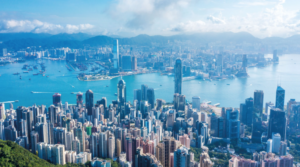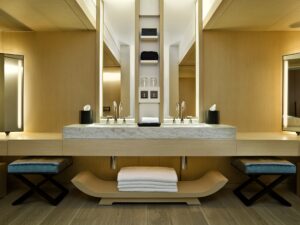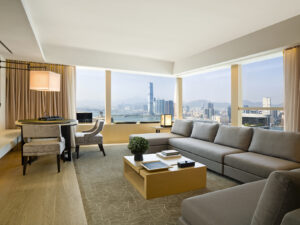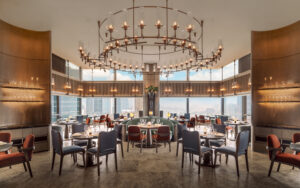
Hong Kong has not been getting the most favorable press of late, yet the former British colony – handed back to China in 1997, its economic and political independence guaranteed by treaty for 50 years until 2047 – is still a powerhouse. Hong Kong is the world’s fourth highest-ranked financial center and boasts one of the world’s most significant commercial ports. It is also the world’s ninth-largest exporter, its eighth-largest importer and its currency, the Hong Kong dollar, is the world’s ninth most traded currency. The former colony is home to more billionaires than Monaco, Switzerland and the United Arab Emirates (UAE) combined – per Forbes Billionaires (April 2024) – and, fun fact and with apologies to New York City –has the largest number of skyscrapers of any city in the world.
The flight from New York, which used to take 18 hours with a stop and had you arriving in a near-zombified state at the other end, now takes around 15 hours nonstop, thanks to Cathay Pacific’s over-the-Pole routing. And thanks to Cathay’s stellar business class service, it also has you arriving into Hong Kong’s Chep Lap Kok International Airport as fresh as a plum blossom. Take Cathay’s late-night departure from John F. Kennedy International Airport, enjoy a couple of glasses of Drappier Champagne before a light (but not too light) supper of wok-fried cod in sweetcorn sauce, watch a movie or two and catch a seriously good night’s sleep under a linen-covered duvet on the comfiest flat bed in the airline business, and you’ll wake up just in time for a first-rate breakfast over Beijing – refreshed, ready and positively raring to go.
Whether you head across the Pacific for business or for pleasure, you can’t say you know Asia until you know Hong Kong – and you can’t say you know Hong Kong until you know the wonderful Upper House hotel in its Admiralty District. In a city where any number of legendary hotels clamor for space and attention with one another, this beauty stands elegantly above the competition.

Swinging in to The Upper House’s porte cochère, I was greeted by the very affable Alex, extraordinarily bright-eyed for 6 a.m. – my Cathay flight from New York having arrived a good hour early – who welcomed me like an old family friend and whisked me to my room on the 40th floor. Designated “Upper,” this suite was more like a small country in the clouds, with its baseball-diamond-size living room, its bedroom and plush dressing area, its soothing white bathroom with separate bath and shower rooms and its expansive Hong Kong Island and Victoria Harbor views. A pegboard propped up on an easel on the consul table announced “Welcome home, Jeremy,” and I really felt it meant it. (A pegboard with soul.) There was a shaving kit bearing my initials on the box in the bathroom, solid mahogany shoe trees in the closet and, on the living-room table, a breakfast feast laid out, because as Alex so rightly said, “You can get hungry after a flight.”
Even, I might add, when the flight attendants feed you as well as they do on Cathay.

Upper Suite with view. Courtesy The Upper House.
Elsewhere, not only in my exceptional suite but throughout the public spaces of the hotel, the pale wood and pale gray color palette soothed, while service, like almost everywhere in Hong Kong, was superb. At Upper House you never wait more than a few seconds for a taxi (or the complimentary hotel car); and never carry a shopping bag without someone springing to assist you. Generosity in all its forms courses through this hotel’s upper-class veins. With clean lines and a sleek aesthetic, swish Upper House struck me as a minimalist hotel with a maximalist heart.
Outside the hotel, there were still reminders throughout of Hong Kong’s British past. Driving is on the left, cars have British-style license plates and, with multiple stores throughout the territory, the clothing, home-goods and grocery chain Marks & Spencer is still going strong.
Inside, in the wet bar in my suite at Upper House, I found a British-made electric kettle with a standard 220V British plug for super-quick boiling and packets of McVitie’s milk chocolate digestive biscuits for nibbling – McVitie’s being to British people what Oreos are to Americans. Baked beans, an English breakfast staple, were served with the Upper House’s first-class “full English” breakfast.
Although the hotel does not have a dedicated spa, a number of top-of-the-line treatments are available in guest rooms. Even more enticingly, Upper House has just entered into a new collaboration with 10x Longevity, a wellness center situated just 50 yards from the hotel, which offers hyperbaric oxygen therapy, infrared sauna and light therapy. Combined, these treatments can support immune health; stimulate the mitochondria, (the part of our cells responsible for energy production); challenge our cardiovascular systems; and get our hearts pumping without doing a workout. Plus, as 10x Longevity’s founder, Jill Van Vugt, told me, the most important benefit of all, and the one that informs all others – regenerative skin treatments, which increase cellular regeneration.
Hong Kong, it struck me – where life expectancy, according to 2022 Bloomberg figures, is the highest in the world, along with Japan’s – seems a fitting base for her new company.
I was keen to learn more about Hong Kong’s financial health, too. Why has the territory’s post-Covid-19 recovery been slower than expected and why are prices for luxury apartments, which until recently constituted the most expensive real estate in the world, been dropping?

At the Upper House’s polished 49th floor Mediterranean restaurant, Salisterra, I put the question to the hotel’s general manager, Kristina Snaith-Lense, over an excellent lunch of Obsiblue prawn crudo, sea snails with Puy lentils and succulent roasted spring chicken. “We bounced back after Covid, but then last year we saw an unexpected dip. Then again, Hong Kong being Hong Kong, everything will be back.” As I speared my Spanish churros with cinnamon dust and took another bite of the sublime orange blossom meringue dessert, I took in the spectacular view of Hong Kong Island, across Victoria Harbor to Kowloon, the northern section of Hong Kong on the Chinese mainland, and counted more than 40 cranes. In terms of building alone, there is no sense of a downturn.
I got another take on this on the street, when I drew parallel with two grandees, lawyers or bankers possibly, and overheard them talking. “Depression, recession? I don’t buy it,” said one. “Ah,” his companion replied, “but a depression, whether you believe it or not, is precisely when you should buy.”
Say you read it here. Because Hong Kong is, and will likely always be, a phenomenon. Its cultural scene is booming, hotels and restaurants continue to open apace, and petty crime – owing to Confucianism-based family-oriented values, a professional police force and strict gun laws – remains low.
“I’ve heard a few people say the money is going to Japan,” Stephanie Shiu, director of marketing and communications for The Upper House told me, before quickly reminding me that the prestigious (Saudi-backed) LIV Golf Tournament had just been played at the Hong Kong Golf Club and that Art Basel Hong Kong, one of the most important art events in Asia, was opening the following week. Business would be brisk. Upper House would be sold out. “After Hong Kong,” said Shiu, “everywhere seems slow.”
For more, visit cathaypacific.com; thehousecollective.com; 10x-longevity.com;
Travel Talk’s Jeremy Wayne is a luxury travel adviser with Superior Travel of New York. Contact him at jeremy@superiortravel.com.




















